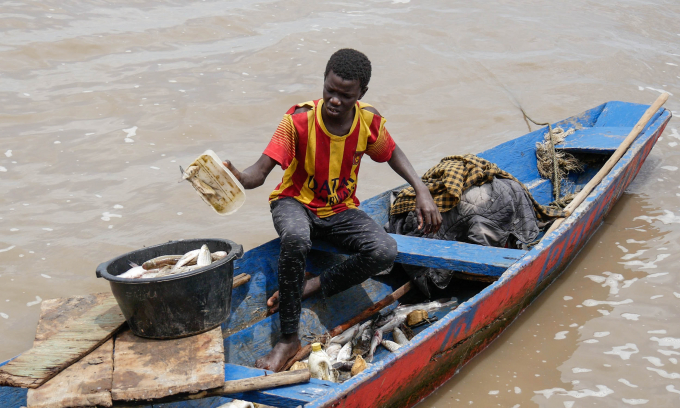June 8, 2025 | 19:32 GMT +7
June 8, 2025 | 19:32 GMT +7
Hotline: 0913.378.918
June 8, 2025 | 19:32 GMT +7
Hotline: 0913.378.918

The FAO-led project, funded by the Green Climate Fund, will adopt climate-resilient strategies to improve the livelihoods of vulnerable people in the Gambia fishing communities.
The Board of the Green Climate Fund (GCF) have approved $60 million in funding to support climate-resilient projects in Benin and the Gambia promoting sustainable practices in vulnerable rural communities of these countries.
The Food and Agriculture Organization of the United Nations (FAO) will offer its expertise to both projects for the sustainable management of natural resources and to help improve the livelihoods of those threatened by the impacts of climate change.
As a unique global platform, GCF invests in low-emission and climate-resilient development to help vulnerable communities adapt to the impacts of climate change. Along with its global partners, GCF catalyses climate investments to facilitate climate adaptation and mitigation strategies in its efforts to achieve the goal of the Paris Agreement.
“FAO welcomes the approval of these projects to accelerate inclusive climate action in Benin and the Gambia. We look forward to working with our partners to promote green and climate-resilient practices across the agriculture, forestry and fisheries sectors to help move towards more efficient, resilient and sustainable agrifood systems,” said FAO Deputy Director-General, Maria Helena Semedo.
GCF Executive Director Yannick Glemarec said: “GCF is proud to partner with FAO on climate-resilient projects in Benin and Gambia, which will help vulnerable rural communities to increase their resilience to climate change and to protect livelihoods in agriculture and fisheries. Furthermore, the projects will promote gender equality, help ensuring the health, safety and livelihoods of women and girls who are disproportionately affected by climate change impacts.”
Climate-resilient agriculture in Benin’s Ouémé basin
With the approval of the Ouémé Basin Climate Resilience Initiative (OCRI), FAO and partners will enhance the climate resilience of communities in the basin and improve agricultural productivity for the 61 percent of the population who depend on agriculture for their livelihoods.
The $35 million for this six-year project will reduce the vulnerability to extreme weather events and climate disruptions facing rural communities. Through climate-resilient agriculture and agroforestry in the Ouémé Basin, approximately 330 000 small-scale farmers stand to directly benefit from these activities.
An integrated approach of low-carbon and climate-resilient basin management, along with the strengthening of climate resilient value chains for maize, shea, mango and cashew, will ensure the project’s long-term sustainability and future impact.
Enhanced climate-resilient land and water practices will be applied on an area of 95 000 hectares in the basin. The project efforts will indirectly benefit the Basin’s 6 million people.
An important component of the project will see FAO work with partners through Farmer Fields Schools and Dimitra Clubs. This includes involving groups of youth to promote and support gender equality, social mobility and people’s participation in the political, social and economic aspects of their communities.
Sustainable aquaculture for fishing communities in the Gambia
This FAO-led project, Climate Resilient Fishery Initiative for Livelihood Improvement in the Gambia, or PROREFISH, is the first GCF-funded project with an emphasis on fisheries, helping vulnerable people belonging to the Gambia’s fishing communities.
This $25 million six-year initiative, which was designed with the assistance of the FAO Investment Centre, will benefit approximately 168 000 people who depend on the fisheries value chain. Through climate adaptation and mitigation techniques, the project will strengthen climate-resilience for the Gambia’s fishery communities who are particularly vulnerable to sea-level rise and climate stressors.
Adaptation measures will comprise of climate-resilient aquaculture, restoring fisheries habitat through mangrove restoration and oyster cultivation and climate-proofing small-scale fishing infrastructures. Climate mitigation through the restoration of 2 350 hectares of mangroves forests will generate carbon sequestration benefits of about 238 519 tonnes over a 20-year lifespan.
Women will be equal beneficiaries in project activities for mangrove restoration which is estimated to support 750 households in the mangrove communities. PROREFISH will adopt gender empowerment activities and also support women to be active participants in the project.
The funding from GCF and partners will initiate the implementation of mitigation and adaptation strategies for vulnerable rural communities in Benin and the Gambia, to better combat climate change threats. With the approval of these two projects, the FAO GCF portfolio will now reach $1 billion.
(FAO.org)

(VAN) With the war ongoing, many Ukrainian farmers and rural farming families face limited access to their land due to mines and lack the financial resources to purchase needed agricultural inputs.

(VAN) Vikas Rambal has quietly built a $5 billion business empire in manufacturing, property and solar, and catapulted onto the Rich List.

(VAN) Available cropland now at less than five percent, according to latest geospatial assessment from FAO and UNOSAT.

(VAN) Alt Carbon has raised $12 million in a seed round as it plans to scale its carbon dioxide removal work in the South Asian nation.

(VAN) Attempts to bring down the price of the Japanese staple have had little effect amid a cost-of-living crisis.

(VAN) Fourth most important food crop in peril as Latin America and Caribbean suffer from slow-onset climate disaster.

(VAN) Shifting market dynamics and the noise around new legislation has propelled Trouw Nutrition’s research around early life nutrition in poultry. Today, it continues to be a key area of research.